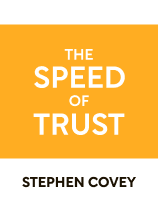

This article is an excerpt from the Shortform book guide to "The Speed of Trust" by Stephen M. R. Covey. Shortform has the world's best summaries and analyses of books you should be reading.
Like this article? Sign up for a free trial here .
What is the importance of knowing how to make someone trust you? What is the best way to earn someone’s trust?
According to The Speed of Trust author Stephen Covey, trust is your most valuable asset in life, yet society greatly undervalues trust in relationships. When learning how to make someone trust you, Covey suggests giving trust is just as important as earning trust.
Keep reading to learn how to make someone trust you, according to Covey’s explanation.
Give Trust to Earn Trust
To understand how to make someone trust you, Covey notes that one of the best ways to get trust is to give it. Covey explains that people have a natural inclination to trust and an innate desire to be trusted. He argues that when people are trusted, they almost always rise to the occasion. In contrast, when they feel like they aren’t trusted, they may (consciously or unconsciously) underperform or even act in untrustworthy ways. Therefore, even though it might seem scary, Covey assures you that you will get the most out of your personal and professional relationships (reap the most trust dividends) when you choose to extend trust.
| How to Make Someone Trust You by Demonstrating Trust To understand how to make someone trust you, it’s important that the people you choose to trust also know you trust them to extend trust back to you. For example, as an employer, you may trust your employees, but if you don’t communicate that trust to them through your words and actions, they may not even know that you trust them and may not trust you back. Therefore, if you trust people without communicating that trust, you risk losing trust dividends from the relationship. As Covey notes, trust dividends are large in a high-trust work environment. Research shows that employees work harder, perform better, and even work beyond the scope of their role when they feel their employer trusts them. A few ways managers can demonstrate their trust in their employees include giving them control over their work process, sharing information freely, and showing their investment in employees by supporting their professional development. |
Exercising Good Judgment in Trust
Choosing to extend trust does not mean you should abandon your reasoning and judgment. While Covey maintains that trust will almost always bring dividends, blind trust exposes you to unnecessary risk and can result in devastating trust taxes (for instance, someone stealing from you or running your business into the ground). Therefore, making someone trust you means you should default to trust over suspicion while maintaining a high vigilance for potential risks, according to Covey. This might look like hiring a mildly under-qualified new employee who comes highly recommended by a trusted friend and ensuring that they have extra training and oversight.
| Why We Trust “Blindly” Humans are biologically programmed for trust. We seek connection with other people and generally (barring having experienced severe breaches of trust) default to trust over suspicion in an effort to form relationships. However, as Covey notes, there are times when trust isn’t warranted, but we extend it anyway. Researchers have found two main thought processes that lead us to extend trust when we shouldn’t: First, while we understand that bad things happen, we tend to think of ourselves as far less likely than other people to experience unfortunate events. Second, we similarly think of ourselves as far more likely to experience fortunate events than others. Together, these two assumptions cause us to misjudge the probability of a bad outcome due to misplaced trust. |

———End of Preview———
Like what you just read? Read the rest of the world's best book summary and analysis of Stephen M. R. Covey's "The Speed of Trust" at Shortform .
Here's what you'll find in our full The Speed of Trust summary :
- Why trust is the ultimate key to success
- A roadmap for building and leveraging trust
- An explanation of Steven Covey's “four cores of credibility”






